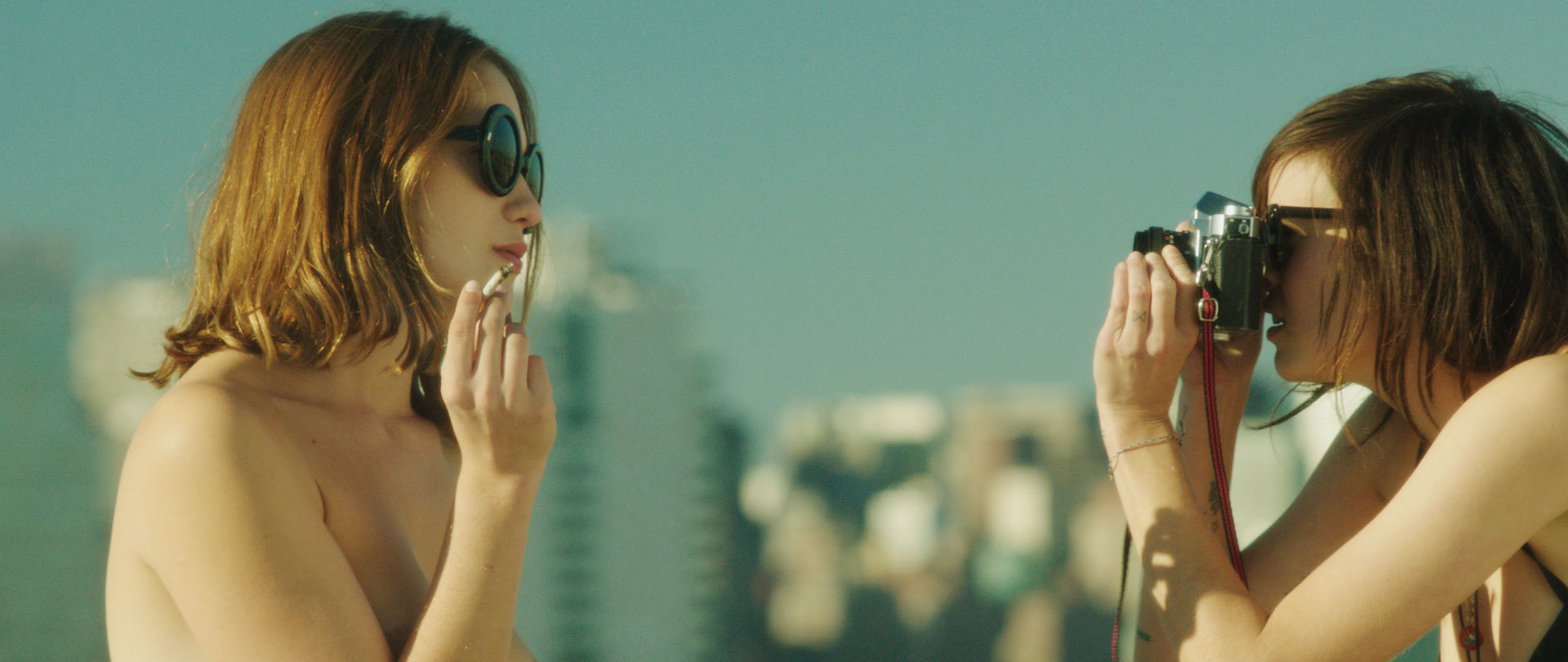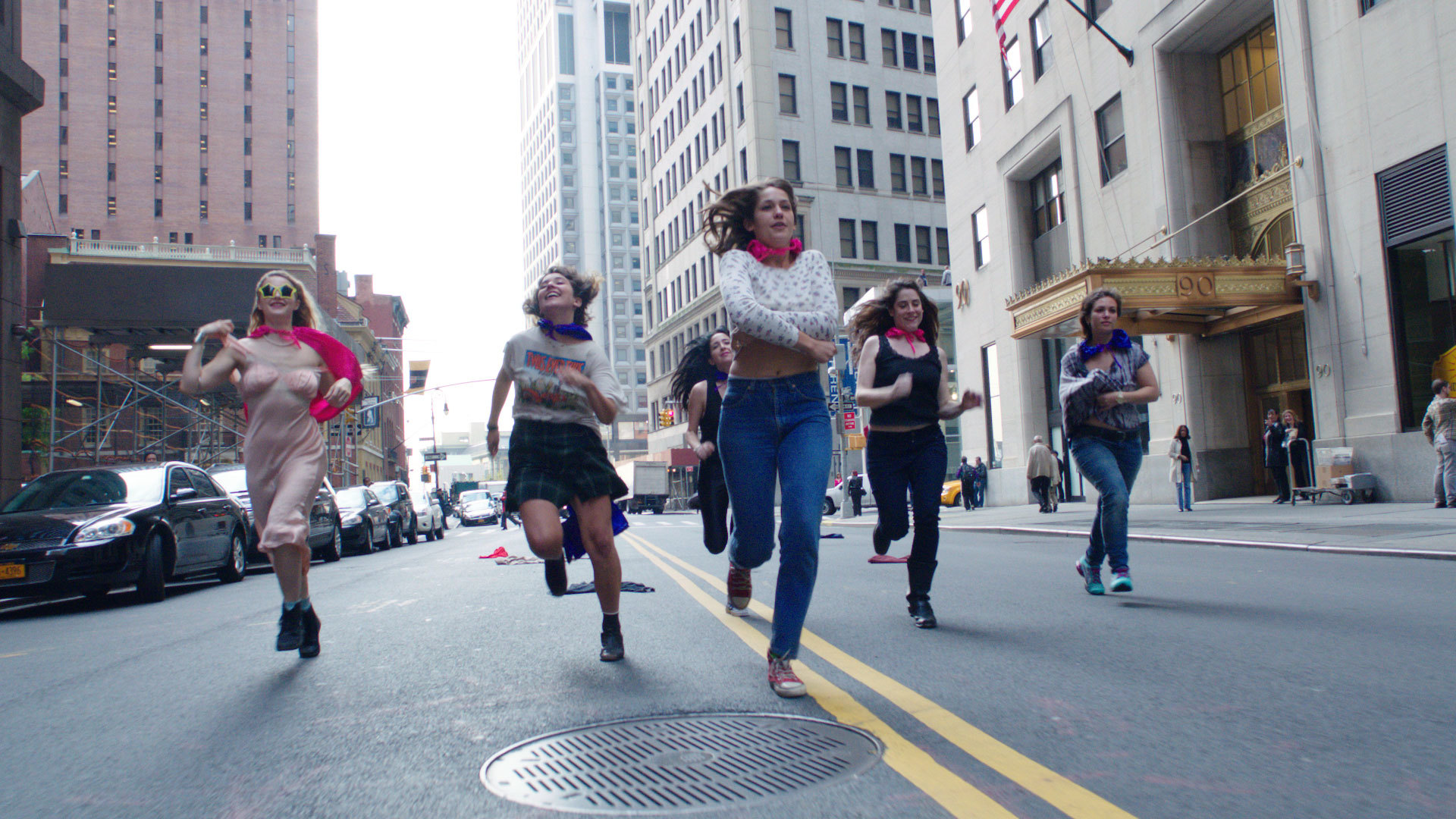Unless you’ve been living under a rock, you’ve probably heard of the phrase ”free the nipple”. It’s a hashtag, the name of a movement, and now the title of a film that’s about to be released this month. Cara’s a fan, Miley’s a fan (in fact she’s actually recording a song for the film’s soundtrack) and the whole of the Willis family are fans. Born as a reaction to America’s widespread censorship of the female nipple, (it’s illegal to get your nips out in 35 states!) the film focuses on a group of topless women who take to the streets of New York in protest. We caught up with founder and director Lina Esco, who also stars in the film alongside Lola Kirke, to talk about getting in trouble with the police, going topless in public, and why some people think the female nip is the worst thing since unsliced bread. #freethenipple
What’s the story behind Free the Nipple and what made you decide to turn it into a film?
The idea for a film started four-years-ago, before the movement. My best friend is my biggest inspiration, she’s the most free person I know, but she was kicked out of church when she was five months old because her mum was breastfeeding her. And ever since then she’s made it her life’s mission to not live by any laws, she just wants to be free. If you go to her house she’s always naked and I started shooting videos of her.
While writing the script I started to look at the history of gender inequality and women’s rights, going all the way back to Susan B. Anthony, who in the late 19th Century was one of the first women in America to fight for women’s rights. I realised I wanted to do a fun movie, not a movie that pushes truths on people. It’s about the passion we feel for this cause.
Why was it so important to you to make this movie?
Inequality is something that bothers me. I’ve never felt unequal to men; all the men in my life are amazing. I have nothing to complain about, but thinking about the larger picture, you see inequality everywhere. In Hollywood movies, the lead character is always male and the women live through the men. We don’t have enough strong female role models. I want young boys and girls to be inspired by it. We’re all the same, but we’re not being treated as equals.
How has social media helped your cause? On the one hand you must have had your accounts blocked numerous times for showing nips, but then on the other hand it helps spread the message to millions…
Social media has been a big support, a by the people for the people kind of thing. A lot of the first people who saw the film were like, ”how do we market a film like this?” so I decided to start a campaign and market the film myself.
Why was it so important to make a fun feature film as opposed to a documentary?
A documentary is so serious, and I grew up working in theatre. I knew that I wanted to direct a feature but I wanted to do it about something I was passionate about. And I wanted to make it funny in order to engage people.

Were you worried that the name ‘Free the Nipple’ would detract from the integrity of the cause?
If I were to make a film and call it Equality, no one would be talking about it! The whole point of it was to open a dialogue with people and discuss why the areola seems to be the most obscene thing on the planet.
What is the main problem you hope to address with the film?
In America we can sexualise and objectify breasts. As long as you cover the areola you can do whatever the fuck you want with them. The moment a women shows her areolas and really owns it, you’re committing a crime. You can get up to three years jail time in Louisiana. It’s still illegal in some states. Being topless is not the same as nudity. There are so many laws against women’s bodies but barely any against men! In the early 1900s, 1000s of men were getting arrested for going topless because they didn’t want to wear their one-piece suits. It took four guys from Coney Island to fight the law in 1936, and they passed it. Now men enjoy the right to go topless. And we want that. The nipple has become the symbol of female oppression.
How do you deal with people criticising you for popularising and commoditising such a serious cause?
Critics have said you’re putting a price tag on feminism what with the Free the Nipple t-shirts and all the potential cinema ticket sales, and the fact that you’re using celebs like Miley Cyrus and Cara Delevingne to enforce it.There are always going to be haters. A lot of it comes from ignorance; the money from the t-shirts and things are for lawyers as we hope to take it to the Supreme Court so that gender equality can become law under the federal government.
What set backs have you come up against?
Millions! With a name like Free the Nipple it’s been really tough to get licences for all the music. Also the reason I wanted to shoot it in New York is because it’s been legal to show nipples there since 1992. But, when filming the opening scene which shows a bunch of topless girls running around Wall Street, even though we got a permit and had a cop on the site, as soon as I shout, ”action!” the cop came over and was like, ”you better ask these girls to cover up or I’m going to shut your production”. And I was like, “but it’s legal to be topless in New York!” but he said, “it looks like pornography to passer-by”. It pisses me off.
What was it like going topless in public?
I grew up Catholic and so very repressed. So going topless in New York was one of the scariest things I’ve ever done, but also the most liberating thing. And when a guy tells you you can’t do it, you feel so violated.
Do you think things will get better in the future?
I think it will take a long time, but already the next generation are starting to write papers about it, 13 year olds are being taught about this. People at college are talking about Free the Nipple. The teachers are bringing this up. It’s already in the educational system, so I’m thinking there is hope.
Read our interview with the film’s star Lola Kirke
Credits
Text Tish Weinstock
Film stills from Free The Nipple, 2014, Lina Esco
